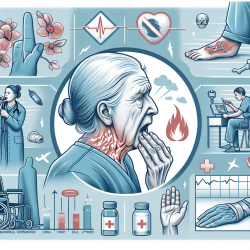Understanding the Impact of Dysphagia in Geriatric Trauma Patients
As a speech-language pathologist, the importance of early identification and intervention for dysphagia cannot be overstated, especially in geriatric trauma patients. A recent study titled "Dysphagia is associated with worse clinical outcomes in geriatric trauma patients" highlights the significant impact of dysphagia on clinical outcomes in this vulnerable population.
Key Findings from the Study
The study involved a retrospective cohort analysis of trauma patients aged 65 years and older. The results were alarming: 4% of these patients were diagnosed with dysphagia, which was associated with increased odds of unplanned ICU admissions, non-home discharges, and longer hospital and ICU stays. Although the increased odds of mortality did not reach statistical significance, the study found a 73% posterior probability that dysphagia was associated with increased mortality.
Implications for Clinical Practice
Given these findings, it is crucial for practitioners to consider the implementation of rigorous dysphagia screening protocols for geriatric trauma patients. Currently, the absence of standardized screening leads to underdiagnosis, with only symptomatic patients being evaluated. This lack of early detection can result in adverse outcomes such as aspiration pneumonia, malnutrition, and prolonged hospitalization.
Steps to Improve Outcomes
- Implement routine dysphagia screening for all geriatric trauma patients upon admission.
- Utilize validated screening tools, such as the Modified Barium Swallow (MBS) and Fiberoptic Endoscopic Evaluation of Swallowing (FEES), for accurate diagnosis.
- Train healthcare staff on the importance of early dysphagia detection and management.
- Collaborate with interdisciplinary teams to develop individualized care plans for patients diagnosed with dysphagia.
Encouraging Further Research
The study underscores the need for further research to explore the modifiability of dysphagia as a risk factor and its relationship with frailty. Prospective studies could provide more insights into the benefits of early recognition and intervention, ultimately leading to improved patient outcomes.
To read the original research paper, please follow this link: Dysphagia is associated with worse clinical outcomes in geriatric trauma patients.










